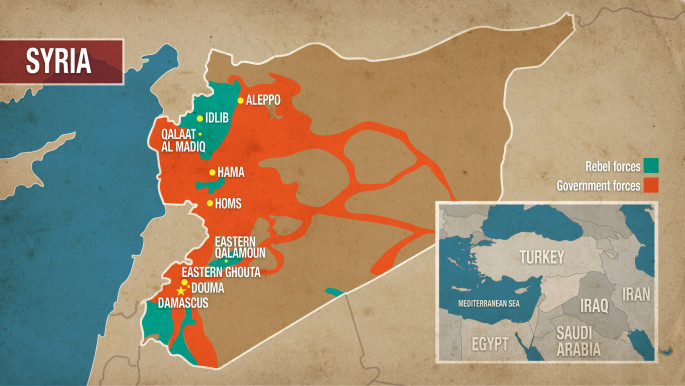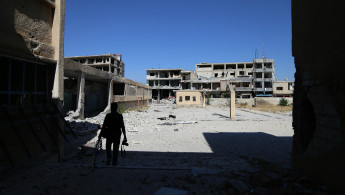'Justice will triumph over injustice': Armed opposition groups believe the Syrian revolution lives on
With the intervention of the Russians, a period of constant military wins for the regime began in 2015.
The regime took back Aleppo, Ghouta, and Rastan in northern Homs and is now gaining ground in Daraa towards the Jordanian border.
Many consider the armed opposition defeated and the Syrian uprising dead. However, opposition groups are keeping faith in what they call "the Syrian revolution".
The Syrian conflict began when the Baath regime, in power since 1963 and led by President Bashar al-Assad, responded with military force to peaceful protests demanding democratic reforms during the Arab Spring wave of uprisings, triggering an armed rebellion fuelled by mass defections from the Syrian army.
According to independent monitors, hundreds of thousands of civilians have been killed in the war, mostly by the regime and its powerful allies, and millions have been displaced both inside and outside of Syria.
The brutal tactics pursued mainly by the regime, which have included the use of chemical weapons, sieges, mass executions and torture against civilians have led to war crimes investigations.
Read also: After Daraa, will Assad reconquer all of Syria?
Izzeddin Salam, a member of the political office of Festaqem Kema Umirt - an Aleppo-based rebel brigade - rejected the idea that the revolution was dead.
"The revolution is an idea and the idea won't die until the people die," he told The New Arab. "The revolution is continuing but in another way. We have huge judicial files against the regime and Iran over their support of terrorism like Islamic State and al-Qaeda."
 |
|
Izzeddin Salam sees the armed opposition's military losses in Ghouta and Damascus as the result of an international decision to leave the rebels isolated and accept Assad's ongoing rule.
Fathi Hassoun, the leader of Harakat Tahrir Watan, formally known as Tahrir Homs, a brigade formerly based in the Rastan pocket in northern Homs, agrees with Salam and says the revolution is at a "critical stage". He too denies it is dead.
"[The revolution] is continuous and its effects are witnessed before our eyes, including the inability of the regime to manage the areas it has recently controlled," he said.
Hassoun says the ongoing fighting in southwest Syria is proof the uprising still lives:
"The resistance shown by the factions of the south who preferred death to recognising the regime is evidence the revolution is alive."
 |
It's now been seven years since the revolution started. The Assad regime is a criminal regime supported by Iranian militias and the Russian killing machine |  |
A former senior member of the Ahrar al-Sham faction, who asked to remain anonymous for his security, also agreed.
The opposition is in a difficult situation, he says, but he points out that the opposition has had many such difficult moments.
"It's now been seven years since the revolution started. The Assad regime is a criminal regime supported by Iranian militias and the Russian killing machine," he said.
It has been the regime's targeting of families and infrastructure that has set back the opposition, he argued.
"Many rebels were in places under siege. They resisted for a long time, but the Russians and Iranians targeted civilians and facilities, forcing the rebels to surrender," he said.
"Russia, Iran and the regime targeted civilians and facilities in revenge for any operation by rebels. This led to a humanitarian crisis which affected rebels."
Abu Berra, the leader of the northern sector of Jaysh al-Islam, a formerly Ghouta-based faction, sees Russia's massive attacks alongside Assad's war crimes and use of chemical weapons as the principal setbacks for the armed opposition.
"The Syrian revolution is not 'areas of control' - the revolution is values and principles which can't be killed by weapons," he told The New Arab. "The Syrian revolution is alive in the hearts of its sons. The murderer can't be victorious, and the oppressor can't continue to oppress the people. Justice will triumph over injustice."
 |
The Syrian revolution is not 'areas of control' - the revolution is values and principles which can't be killed by weapons |  |
Remaining rebel presence in Syria
Salam hopes the recent electoral victory of Turkish President Erdogan will secure the rebels' presence in northern Syria.
"The victory of the Justice and Development party opens the way to fight in the north in the face of a possible regime assault after the end of its operations in southwest Syria. Russians and Iranians made promises for northwest Syria, but they are liars," said the Festaqem Kema Umirt member.
Dr Muhammed Vecih Cuma is the President of the Syrian-Turkmen Assembly, which represents Syrian Turkmen.
"In many regards, the fate of the Syrian revolution is connected to Turkey. Turkey is the only state which seeks the stability and safety of Syria and works for it through political means," he told The New Arab.
"Turkey protects its own national security and takes steps for the safety of the Syrian people. Turkey is also the biggest provider of humanitarian assistance for Syrians. The Turkish and Syrian people share common values. Turkey is the only state in the Middle East which doesn't fear a democratic Syria."
 |
The fate of the Syrian revolution is connected to Turkey. Turkey is the only state which seeks the stability and safety of Syria and works for it through political means |  |
While the remaining rebel presence in southwest Syria are under attack by the regime and Russian air force, all other rebel presences in Syria are either under direct Turkish control as in Afrin and northern Aleppo, or under Turkish influence as in Idlib where Turkey established 12 "observation points" to ensure the de-escalation zone in Idlib agreed within the Astana process.
The unnamed former senior member of Ahrar al Sham also referred to these key areas: "Rebels still have a presence in Aleppo, Afrin, Idlib and Daraa."
"The situation in Deraa now is really bad. Russians are primarily targeting civilians. Therefore the situation is difficult, but rebels strike back causing huge causalities to the enemy."
International dynamics can change dynamics in Syria
|
Fatih Hassoun, leader of Harakat Tahrir Watan, blames the international community for the situation in which the armed opposition now finds itself.
"This is due primarily to the failure of the international community and to its focus on the half-cup of terrorism and confronting it," he said.
"Its vision was limited to fighting terrorism by extremist organisations like IS, excluding the regime's militias and allies despite all the crimes committed by them. Which enabled the regime to implement and achieve its goal."
The Ahrar al-Sham ex-member agrees, saying that while Russia and Iran invested huge resources into the regime, other foreign actors hadn't supported the rebels and limited themselves to only "condemning" crimes committed by the regime.
"No real support was given to rebels, but the regime bought foreign fighters and got huge foreign support to such an extent that Russia and Iran colonised Syria.
"The regime is only a puppet. Russians and Iranians do whatever they want. They make deals and agreements in the name of the regime. Rebels on the other hand are neither a state nor an established militia like Hizballah," he said.
"If rebels were strong, no foreign power could withhold them from toppling the regime. Rebels have the capability to change everything in Syria."
 |
The regime is only a puppet. Russians and Iranians do whatever they want. They make deals and agreements in the name of the regime |  |
The former senior Ahrar al-Sham member also thinks that the situation in Syria could change if foreign powers were to change their attitude towards the rebels.
"The revolution isn't dead," he said. "All deals could be cancelled like the Iranian nuclear agreement which was cancelled by US President Donald Trump.
"Rebels maintained their presence without a real foreign support. If rebels get support, everything in Syria would change immediately."
Ömer Özkizilcik works as an analyst at the Middle East Foundation in Ankara and is the editor of Suriye Gündemi, a Turkish news site about the Syrian conflict.
Follow him on Twitter: @OmerOzkizilcik



